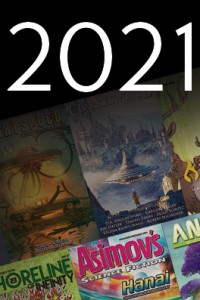The Year in Review 2024 by Graham Sleight

Some years, it feels like there’s a central book in SF and fantasy, one around which the conversation orbits. A few obvious examples: Neuromancer in 1984, Ancillary Justice in 2013, This Is How You Lose the Time War in 2019. In my reading, 2024 was not such a year. There were plenty of good books – see below – but as a year it felt curiously decentered, as if the elements of the field were speeding away from each other. So the pleasures of reading SF and fantasy were even more various than I can recall them being before.
 Paolo Bacigalupi’s Navola (Head of Zeus) had a great deal of fun exploring its Italianate secondary world, before getting started with its true plot mechanics a little later on.
Paolo Bacigalupi’s Navola (Head of Zeus) had a great deal of fun exploring its Italianate secondary world, before getting started with its true plot mechanics a little later on.
For many, I suspect Kaliane Bradley’s The Ministry of Time (Sceptre) was the debut of the year. It was certainly executed remarkably effectively, bringing together a London civil servant and a long-lost explorer. Larger questions – of climate change and the costs of exploration – came into focus too. Echo of Worlds by M.R. Carey (Orbit) concluded the story begun by last year’s Infinity Gate in some style. It had high space-opera stakes, a varied gang of protagonists, and a wide range of vivid settings.
Rakesfall by Vajra Chandrasekera (Tordotcom) was very different from 2023’s The Saint of Bright Doors. It encompassed Sri Lanka’s civil war, the impact of media representations, and numerous surreal or shocking images. Told from a thrillingly broad range of viewpoints, it was certainly one of my books of the year. By contrast, Memorials by Richard Chizmar (Hodder and Stoughton) felt quite traditional – not least because of its 1983 setting – but was marvellously accomplished. (The premise, of a group of students on a doom-shadowed road trip, reminded me of Robert Silverberg’s The Book of Skulls (1972).) Here the narrative drive was provided by a fascination with roadside memorials to past accidents.
 Metal from Heaven (Erewhon) by August Clarke had intriguing, detailed worldbuilding, a thoughtful sense of how the elements of the setting interacted, and a plot which gave a full tour of them. The Mercy of Gods by James S.A. Corey (Orbit) kicked off a new trilogy with an intensely challenging set of alien-created constraints for its humans to live within. One suspects the ground may shift in future volumes. To call it a page-turner sounds like damning with faint praise, but creating a work that’s so readable is no small achievement. The Dead Cat Tail Assassins by P. Djèlí Clark (Tordotcom) fascinatingly took on the uses of history and forgetting in a fantasy city that has made complicated use of both.
Metal from Heaven (Erewhon) by August Clarke had intriguing, detailed worldbuilding, a thoughtful sense of how the elements of the setting interacted, and a plot which gave a full tour of them. The Mercy of Gods by James S.A. Corey (Orbit) kicked off a new trilogy with an intensely challenging set of alien-created constraints for its humans to live within. One suspects the ground may shift in future volumes. To call it a page-turner sounds like damning with faint praise, but creating a work that’s so readable is no small achievement. The Dead Cat Tail Assassins by P. Djèlí Clark (Tordotcom) fascinatingly took on the uses of history and forgetting in a fantasy city that has made complicated use of both.
The Bright Sword by Lev Grossman (Viking) is an aftermath book: Its central subject is making sense of the world – or rather, Britain – in the wake of the core Arthurian legends. This is well-tilled ground, but Grossman is too skilful a writer to make the predictable points. Blackheart Man by Nalo Hopkinson (Saga) is another ambitious fantasy, apparently one that’s been in the works for some time. It has a rich island setting and an intriguingly flawed protagonist. It feels odd to think of The Book of Love by Kelly Link (Random House) as a first novel, but facts are facts: Although she’s been writing some of the most extraordinary shorter fiction in the field for a couple of decades, this is the first time Link has attempted something on this scale. What’s preserved here from the short fiction is that distinctive Link voice, the angle from which she approaches the world.
The Wilding (Gollancz) by Ian McDonald was a surprise after last year’s huge Hopeland: a relatively short folk-horror novel that dug deep into the landscape of Ireland. McDonald proved himself just as adept at this kind of narrative as on bigger canvasses. Beyond the Light Horizon by Ken MacLeod (Pyr) concluded a trilogy that hasn’t received as much attention as some of Macleod’s previous work: a shame, as its cosmological speculations are as radical as anything he’s written before. The Great When by Alan Moore (Bloomsbury) is, in a sense, another addition to the lengthy shelf of fantasies riffing on the history of London. (It’s the first instalment in a series, too.) What marks it out for me is Moore’s linguistic inventiveness – especially in several visionary passages – and the sense of rightness attaching to the connections he draws.
I picked up The Imposition of Unnecessary Obstacles by Malka Older (Tordotcom) without realising it was volume two in a series. I didn’t have any problem, though, with following its detective/romance story or picking up on the necessary background. I’ll certainly be going back to read the first volume now. Playground by Richard Powers (Norton) was rightly recognised for the breadth of its ecological concerns and the skilled application of some SFnal devices to examine them. Even though the book holds quite a few surprises, none of them feel forced – rather, they augment its impact. The Practice, the Horizon, and the Chain by Sofia Samatar (Tordotcom) was an inventive and cutting riff on the academia stories that proliferate these days, and contributes to the sense that Samatar’s body of work is one of the most intriguing and varied to have begun recently. Kinning by Nisi Shawl (Tor) is a sequel of sorts to Everfair (2016) but spends much of its time on a thought experiment around empathy: what it is, how and whether it should be induced. In that respect, it was both informed by past examples in the genre and felt – largely because of its setting – like a fresh view.
 I can’t claim that I’ve kept up with all of Adrian Tchaikovsky’s recent books (there are a lot of them!) but I thoroughly enjoyed Alien Clay (Orbit), which intriguingly dug into exoplanet exology and what it might mean for humans there. Bury Your Gays by Chuck Tingle (Tor) was an entertaining if graphic horror novel where Hollywood is the greatest horror. By the arbitrariness of alphabetical order, the next book happens to be The Empusium by Olga Tokarczuk, subtitled ‘‘A Health Resort Horror Story’’. Its revision of Thomas Mann’s The Magic Mountain is fascinatingly over the top, and is at least as surprising as the Tingle. The City in Glass by Nghi Vo (Tordotcom) was an exploration of another fantastic city – perhaps that was the theme of the year? – through the viewpoint of a demon. It certainly had one of the most intriguing settings I’ve seen in a long while. And The Underhistory by Kaaron Warren (Profile) was a gripping Gothic, a haunted house story, another aftermath tale.
I can’t claim that I’ve kept up with all of Adrian Tchaikovsky’s recent books (there are a lot of them!) but I thoroughly enjoyed Alien Clay (Orbit), which intriguingly dug into exoplanet exology and what it might mean for humans there. Bury Your Gays by Chuck Tingle (Tor) was an entertaining if graphic horror novel where Hollywood is the greatest horror. By the arbitrariness of alphabetical order, the next book happens to be The Empusium by Olga Tokarczuk, subtitled ‘‘A Health Resort Horror Story’’. Its revision of Thomas Mann’s The Magic Mountain is fascinatingly over the top, and is at least as surprising as the Tingle. The City in Glass by Nghi Vo (Tordotcom) was an exploration of another fantastic city – perhaps that was the theme of the year? – through the viewpoint of a demon. It certainly had one of the most intriguing settings I’ve seen in a long while. And The Underhistory by Kaaron Warren (Profile) was a gripping Gothic, a haunted house story, another aftermath tale.
 On the non-fiction side, The Book Blinders by John Clute (Norstrilia) is an attractively produced account of the decimation of years’ worth of volumes (both SF and otherwise) whose dustjackets have been removed and destroyed by the British Library. Powsels and Thrums by Alan Garner (Fourth Estate) was, despite its small size, a book of great scope. It encompassed essays, lectures, and fragments of autobiography spanning the whole of Garner’s life. They shed new and often thrilling light on his body of work. Finally, Track Changes by Abigail Nussbaum (Briardene) was a long-overdue collection of reviews and essays by a critic who’s gratifyingly unwilling to put up with less than the best.
On the non-fiction side, The Book Blinders by John Clute (Norstrilia) is an attractively produced account of the decimation of years’ worth of volumes (both SF and otherwise) whose dustjackets have been removed and destroyed by the British Library. Powsels and Thrums by Alan Garner (Fourth Estate) was, despite its small size, a book of great scope. It encompassed essays, lectures, and fragments of autobiography spanning the whole of Garner’s life. They shed new and often thrilling light on his body of work. Finally, Track Changes by Abigail Nussbaum (Briardene) was a long-overdue collection of reviews and essays by a critic who’s gratifyingly unwilling to put up with less than the best.
But to return to where I started, my overwhelming impression of this year is as one where books could feel thoroughly contemporary, and very good, without sharing much in common. Perhaps this is just a sign that what’s happening to other elements of the culture is happening to SF/F: Different kinds of viewpoint or experience are becoming more and more sorted into their own categories, so that finding surprising works becomes ever more a voyage of discovery. But that, surely, is part of the fun.
Ten books of the year:
The Ministry of Time, Kaliane Bradley
Rakesfall, Vajra Chandrasekra
Powsels and Thrums, Alan Garner
The Book of Love, Kelly Link
The Wilding, Ian McDonald
Track Changes, Abigail Nussbaum
Playground, Richard Powers
The Practice, the Horizon, and the Chain, Sofia Samatar
Kinning, Nisi Shawl
The City in Glass, Nghi Vo
This review and more like it in the February 2025 issue of Locus.
 While you are here, please take a moment to support Locus with a one-time or recurring donation. We rely on reader donations to keep the magazine and site going, and would like to keep the site paywall free, but WE NEED YOUR FINANCIAL SUPPORT to continue quality coverage of the science fiction and fantasy field.
While you are here, please take a moment to support Locus with a one-time or recurring donation. We rely on reader donations to keep the magazine and site going, and would like to keep the site paywall free, but WE NEED YOUR FINANCIAL SUPPORT to continue quality coverage of the science fiction and fantasy field.
©Locus Magazine. Copyrighted material may not be republished without permission of LSFF.







